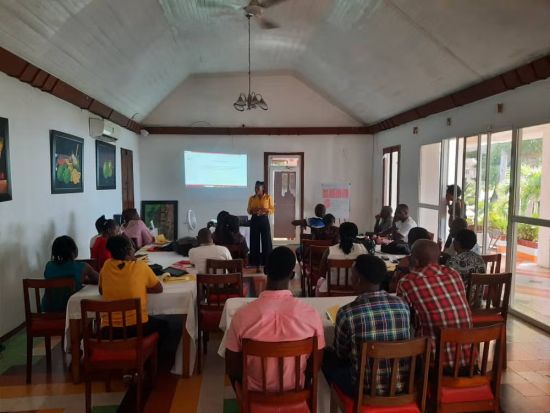Georgetown Receives $27.5 Million to Address HIV/AIDS in Haiti
October 18, 2024
The U.S. Centers for Disease Control and Prevention and the President’s Emergency Plan for AIDS Relief have awarded Georgetown $27.5 million to expand its ongoing work in Haiti to address HIV/AIDS.
The funding builds on the work of the Center for Global Health Practice and Impact to provide medical care for Haitians living with HIV, particularly those who have dropped from treatment, and reduce barriers to treatment.
The award will provide funding for the next five years to expand the center’s data-based approach and innovate new models of care for the estimated 150,000 people living with HIV in Haiti — the highest number in the Caribbean, according to the United States Agency for International Development.
“We are grateful to the CDC and PEPFAR for their recognition and support of this very important and life-altering work for people living with HIV,” said Deus Bazira, director of the Center for Global Health Practice and Impact (CGHPI) and the Global Health Institute. “This work is possible because of our strong team on the ground working in collaboration with the Haiti Ministry of Health, PEPFAR/CDC, international and local partners, civil society, health facilities, health care providers and patient advocacy groups.”
With initial funding from the CDC in 2019, the CGHPI team has helped 6,000 people living with HIV in Haiti return to treatment. They have established 57 drug dispensing points that serve 10,000 patients in all regions of the country, offering greater access to effective antiretroviral treatment. And they have engaged more than 1,000 Haitians, most of whom live with HIV, in economic empowerment activities, an aspect linked to better health outcomes.
These efforts help people living with HIV/AIDS maintain optimal health outcomes, including suppressing the virus and preventing further transmission, said Dr. Babatunji Oni, the CGHPI’s senior program director and the lead investigator of the new award.
“Deeply anchored in Georgetown’s value of cura personalis, our work in Haiti provides holistic, person-centered services where it’s most needed,” Oni said.
Working amid significant political instability, poverty and violence, members of the CGHPI’s Haiti-based team have become experts in adapting care delivery through a data-informed and people-centered approach.
An Innovative Model of Care
The CGHPI, based at Georgetown University Medical Center, works to sustainably improve health outcomes by translating scientific evidence into policy and practice. CGHPI operates in 12 countries.
In Haiti, the team sought to understand why people living with HIV stopped receiving care — and how they could keep them engaged in care.
For those with HIV, losing access to basic life-saving therapy can lead to unnecessary suffering, risk of transmission to others and possible early death, Oni said.

The team in Haiti at a training session. Photo courtesy of the Center for Global Health Practice and Impact.
Through its program, Translating Data Into Evidence (TIDE), the team leveraged data to better understand client’s individual preferences and differences, and design interventions that would work for them. They also partnered with community organizations that serve people who live with HIV.
This “whole-of-society” approach has resulted in differentiated service delivery models to meet the care needs of people living with HIV, particularly in the midst of instability, unemployment and violence in the country, Bazira said.
The $27.5 million in funding will support a new program phase, TIDE Plus, that will strengthen various approaches to delivering services that ensure treatment continuity; allow for machine learning and predictive modeling to better define targeted care; and support patient-led, grass-root organizations in Haiti to sustain the HIV response.
“The vital work conducted by our Georgetown CGHPI team in Haiti brings health and hope to thousands of people each year — not only to those living with HIV but to their family and friends. Most encouraging is that this work is being led by the people of Haiti ensuring that this work is sustainable,” said Dr. Norman J. Beauchamp Jr., executive vice president for health sciences and executive dean of the School of Medicine.
Oni, in collaboration with the country program director in Haiti, will oversee the work, which includes more than 160 health care workers and other team members country-wide who are working to connect Haitian residents with HIV medications and understand additional needs of those living with the disease. He said the biggest challenge HIV programs in Haiti face are sustaining the response and ensuring that patients have steady, consistent access to care and treatment.
“Our work in Haiti directly addresses these challenges: institutionalizing sustained, patient-led and government supported interventions that increase engagement and retention, and place capable oversight for the HIV program in the hands of local governments and institutions.”
Learn more about Georgetown’s work in Haiti in this Georgetown magazine feature.
Contact
Karen Teber
Associate Vice President, Strategic Communications
Georgetown University Medical Center
km463@georgetown.edu
Source: https://www.georgetown.edu/news/georgetown-receives-27-5-million-to-address-hiv-aids-in-haiti/
"Reproduced with permission - Georgetown University Medical Center"
TGeorgetown University Medical Center
For more HIV and AIDS News visit...
Positively Positive - Living with HIV/AIDS:
HIV/AIDS News
|